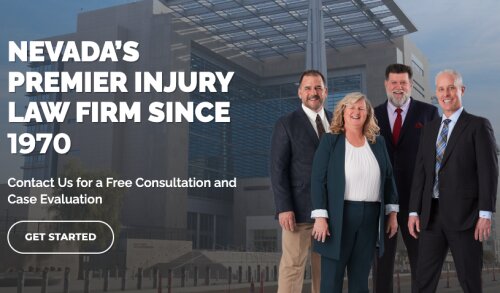Best Retirement Lawyers in Las Vegas
Share your needs with us, get contacted by law firms.
Free. Takes 2 min.
List of the best lawyers in Las Vegas, United States
About Retirement Law in Las Vegas, United States
Retirement law covers the rules and legal issues that affect people preparing for, entering, or living in retirement. In Las Vegas, retirement law touches federal programs such as Social Security, Medicare, and Medicaid, state-administered retirement systems for public employees, private employer-sponsored plans, individual retirement accounts, estate planning, elder law protections, and consumer protections for older adults. Because Nevada has its own laws and administrative practices, residents of Las Vegas should understand how state rules interact with federal benefits and private contracts. Common legal concerns for retirees include protecting retirement income, planning for long-term care, creating or updating wills and trusts, appointing health care and financial decision makers, and defending against elder abuse or financial exploitation.
Why You May Need a Lawyer
There are many situations where a lawyer can add value and protect your rights during retirement. You may need a lawyer to draft or review estate planning documents such as wills, trusts, durable powers of attorney, and advance health care directives so your wishes are clear and legally enforceable. Lawyers can help with Medicaid planning if you anticipate needing long-term nursing home care, so you can protect assets while meeting eligibility rules. If you are dealing with disputes about pensions, social security appeals, or denial of veteran benefits, a lawyer experienced in administrative appeals can improve your chances of success. In cases of suspected elder abuse or financial exploitation, an attorney can advise on protective actions, reporting, asset recovery, and seeking guardianship or conservatorship if a person lacks capacity. Finally, if you are negotiating a move into a retirement community, signing a long-term care contract, or considering a reverse mortgage, legal advice can help you understand contract terms and potential risks.
Local Laws Overview
Nevada law affects retirees in several important ways. Nevada does not levy a state personal income tax, which can be attractive for retirees because most retirement income is not taxed at the state level. Nevada is a community property state for married couples, which can influence how retirement accounts and benefits earned during marriage are treated in divorce or estate matters. Nevada has statutory frameworks for guardianship and conservatorship that allow courts to appoint decision makers for adults who lack capacity when less restrictive alternatives are not appropriate. The state administers Medicaid and other public programs under federal standards, and those programs impact long-term care eligibility and planning. Nevada also has protections and reporting systems for elder abuse and financial exploitation under state law, and local agencies offer services for seniors. Public employee retirement systems, including the Nevada Public Employees Retirement System and local government plans, have their own rules about retirement eligibility, benefit calculations, and survivor benefits that differ from private plans. Finally, Nevada law provides certain creditor and homestead protections that may affect estate planning and asset protection strategies.
Frequently Asked Questions
What is the difference between a will and a trust?
A will is a legal document that directs how your property is distributed after death and names an executor to administer your estate. A trust is a legal arrangement where a trustee holds property for the benefit of named beneficiaries and can provide ongoing management or avoid probate. Trusts can offer greater privacy, faster distribution, and potentially more control over how assets are used after your death. A lawyer can help you decide which instrument fits your goals and how to fund a trust properly.
When should I update my estate planning documents?
You should review and possibly update documents after major life changes such as marriage, divorce, the birth or adoption of a child or grandchild, the death of a beneficiary or executor, significant changes in assets, a move to another state, or a diagnosis that affects capacity. It is also wise to review estate planning documents every few years and when tax or benefit rules change. An attorney can ensure updates comply with Nevada law and reflect your current wishes.
How can I protect my assets from long-term care costs?
Protecting assets for long-term care typically involves careful planning. Options include purchasing long-term care insurance, using certain types of trusts, structuring ownership of property, and engaging in Medicaid planning to meet eligibility criteria while preserving some assets. Transfers or gifting done too close to applying for Medicaid can create periods of ineligibility. Because rules are complex and timing is critical, consult a lawyer experienced in elder law and Medicaid planning to design a lawful strategy tailored to your situation.
What is guardianship and how does it differ from a power of attorney?
Guardianship is a court-ordered appointment of a guardian to make personal or medical decisions for an adult who has been declared legally incapacitated. Conservatorship or similar appointments may cover financial decisions. A power of attorney is a voluntary arrangement you create while you have capacity by appointing an agent to make financial decisions on your behalf. Powers of attorney and advance health care directives are generally less restrictive and are preferred when a person can plan ahead. Guardianship involves court proceedings and oversight, so it is used when advance planning is not in place or when there are concerns about abuse or conflict.
How does Nevada law affect Social Security and Medicare benefits?
Social Security and Medicare are federal programs, so their basic rules are the same in Las Vegas as elsewhere in the United States. However, Nevada state law affects taxation of some benefits and the availability of supplementary programs. Medicare covers health care for eligible people over 65 or with certain disabilities, but it does not cover most long-term custodial care. Medicaid in Nevada may cover long-term care for people who meet income and asset limits. For help with enrollment, coverage questions, and appeals, consult a benefits counselor or attorney who handles federal program appeals.
What should I know before signing a contract with a retirement community or nursing home?
Carefully review the contract to understand admission criteria, fees, services included, fee increase policies, refund rules, transfer and discharge provisions, and dispute resolution mechanisms. Contracts vary widely between independent living, assisted living, and skilled nursing facilities. Ask who is responsible for medical care, medication management, and emergency response. Have a lawyer review any entrance or residency contract, especially if large entrance fees or long-term obligations are involved.
Can my spouse or children be forced to pay my nursing home bills in Nevada?
Medicaid has eligibility rules that may look at spousal income and assets to determine need, and in some cases community spouse resource protections apply to prevent destitution of the healthy spouse. Children are not normally required to pay for a parent’s nursing home care unless there is a specific legal obligation under state law, which is rarely enforced for adult children. Because each case is fact specific, consult an attorney knowledgeable about Medicaid and family law for guidance.
What steps can I take if I suspect financial exploitation or elder abuse?
If you suspect elder abuse or financial exploitation, report it promptly to local Adult Protective Services or to local law enforcement. Document suspicious transactions, preserve bank and account statements, and limit further access to accounts if possible. A lawyer can help you obtain emergency court orders, freeze accounts, pursue recovery of stolen assets, and represent you in guardianship or conservatorship proceedings. Timely action is critical to protect assets and safety.
Do I need a lawyer to appeal a denial of VA, Social Security, or Medicaid benefits?
You do not have to have a lawyer to appeal benefit denials, but an attorney or accredited representative can improve the likelihood of success, especially for complex medical or legal issues. Appeals involve strict deadlines, evidence rules, medical records, and legal arguments. Hiring a lawyer experienced in administrative appeals for the specific program can relieve procedural burdens and present a stronger case.
How much does hiring a retirement or elder law attorney in Las Vegas typically cost?
Costs vary by attorney, the complexity of the matter, and the type of service. Simple document drafting like a will or power of attorney may use a flat fee. More complex work such as estate planning packages, Medicaid planning, litigation, or appeals is often billed hourly or on a hybrid basis. Many attorneys offer an initial consultation for a reduced fee or no fee. Ask about fees, billing methods, and whether you will receive a written engagement agreement before hiring anyone.
Additional Resources
Nevada Aging and Disability Services Division - state agency that provides information and resources for seniors, including Adult Protective Services and community support programs.
Nevada Public Employees Retirement System - administers retirement benefits for many public employees in Nevada and publishes information about eligibility and benefits.
Social Security Administration and Medicare - federal programs that provide retirement income and health coverage; local offices and counselors can assist with enrollment and appeals.
Nevada Division of Health Care Financing and Policy - administers Medicaid in Nevada and provides guidance on long-term care coverage and eligibility.
Legal Aid Center of Southern Nevada and Nevada Legal Services - nonprofit legal organizations that offer free or low-cost legal help to qualifying seniors on issues such as benefits, consumer protection, and elder abuse.
State Bar of Nevada - provides lawyer referral services and information about finding an attorney certified in elder law or estate planning.
AARP Nevada and local senior centers - provide education, advocacy, and local resources for seniors including workshops on financial and legal planning.
Department of Veterans Affairs - for veterans and surviving spouses seeking benefits, health care, and long-term care assistance.
Next Steps
1. Gather key documents before seeking legal advice. Collect recent account statements, retirement plan summaries, pension documents, Social Security award letters, life insurance policies, deeds, mortgage records, existing wills or trusts, powers of attorney, advance health care directives, and any long-term care or assisted living contracts.
2. Identify your priorities and questions. Decide whether your immediate needs are estate planning, Medicaid planning, appeals, guardianship, contract review, or protection from abuse. Make a short list of goals and concerns to discuss with a lawyer.
3. Find the right attorney. Look for attorneys in Las Vegas with experience in elder law, estate planning, probate, or administrative appeals depending on your needs. Use the State Bar lawyer referral service, local legal aid organizations if you qualify, or recommendations from trusted professionals.
4. Prepare for the initial consultation. Ask about the attorney’s experience with matters like yours, fee structure, likely timelines, and what documents you should bring. Be prepared to provide a concise summary of your situation and desired outcome.
5. Consider alternatives and supplemental help. If you cannot afford private counsel, contact legal aid providers, local aging agencies, or advocacy groups for assistance. Financial counselors, benefits counselors, and certified public accountants can also help with tax and benefit questions.
6. Act promptly when urgent issues arise. If you suspect abuse or financial exploitation, report it immediately to Adult Protective Services or law enforcement and consult an attorney to protect assets and safety. For deadlines such as benefit appeals or probate filings, timely action is essential.
Taking these steps will help you protect your retirement income, preserve your health care choices, and secure peace of mind for you and your family in Las Vegas.
Lawzana helps you find the best lawyers and law firms in Las Vegas through a curated and pre-screened list of qualified legal professionals. Our platform offers rankings and detailed profiles of attorneys and law firms, allowing you to compare based on practice areas, including Retirement, experience, and client feedback.
Each profile includes a description of the firm's areas of practice, client reviews, team members and partners, year of establishment, spoken languages, office locations, contact information, social media presence, and any published articles or resources. Most firms on our platform speak English and are experienced in both local and international legal matters.
Get a quote from top-rated law firms in Las Vegas, United States — quickly, securely, and without unnecessary hassle.
Disclaimer:
The information provided on this page is for general informational purposes only and does not constitute legal advice. While we strive to ensure the accuracy and relevance of the content, legal information may change over time, and interpretations of the law can vary. You should always consult with a qualified legal professional for advice specific to your situation.
We disclaim all liability for actions taken or not taken based on the content of this page. If you believe any information is incorrect or outdated, please contact us, and we will review and update it where appropriate.











